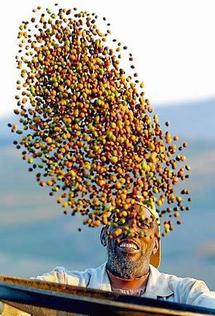
For the study, 766 participants enrolled in the Hepatitis C Antiviral Long-Term Treatment against Cirrhosis (HALT-C) trial -- all of whom had hepatitis C which had not responded to treatment with anti-viral drugs -- were asked to report how many cups of coffee they drank every day.
The patients were seen every three months during the 3.8-year study and liver biopsies were taken at 1.5 and 3.5 five years to determine the progression of liver disease.
"We observed an inverse association between coffee intake and liver disease progression," meaning patients who drank three or more cups of java were less likely to see their liver disease worsen than non-drinkers, wrote the authors of the study, which will be published in the November issue of Hepatology.
The researchers put forward several ways in which coffee intake might protect against liver disease, including by reducing the risk of type two diabetes, which has been associated with liver illness; or by reducing inflammation, which is thought to cause fibrosis and cirrhosis of the liver.
Even caffeine, the chemical that gives a cup of coffee its oomph, came under the spotlight, having been found in previous studies to inhibit liver cancer in rats.
But drinking black or green tea, which also contain caffeine, had little impact on the progression of liver disease, although there were few tea drinkers in the study.
According to the World Health Organization (WHO) three to four million people contract hepatitis C each year.
Seventy percent of cases become chronic and can cause cirrhosis or liver cancer.
-----------------------------------------------------------------------------------------------------------------------------
The patients were seen every three months during the 3.8-year study and liver biopsies were taken at 1.5 and 3.5 five years to determine the progression of liver disease.
"We observed an inverse association between coffee intake and liver disease progression," meaning patients who drank three or more cups of java were less likely to see their liver disease worsen than non-drinkers, wrote the authors of the study, which will be published in the November issue of Hepatology.
The researchers put forward several ways in which coffee intake might protect against liver disease, including by reducing the risk of type two diabetes, which has been associated with liver illness; or by reducing inflammation, which is thought to cause fibrosis and cirrhosis of the liver.
Even caffeine, the chemical that gives a cup of coffee its oomph, came under the spotlight, having been found in previous studies to inhibit liver cancer in rats.
But drinking black or green tea, which also contain caffeine, had little impact on the progression of liver disease, although there were few tea drinkers in the study.
According to the World Health Organization (WHO) three to four million people contract hepatitis C each year.
Seventy percent of cases become chronic and can cause cirrhosis or liver cancer.
-----------------------------------------------------------------------------------------------------------------------------









 Home
Home Politics
Politics









